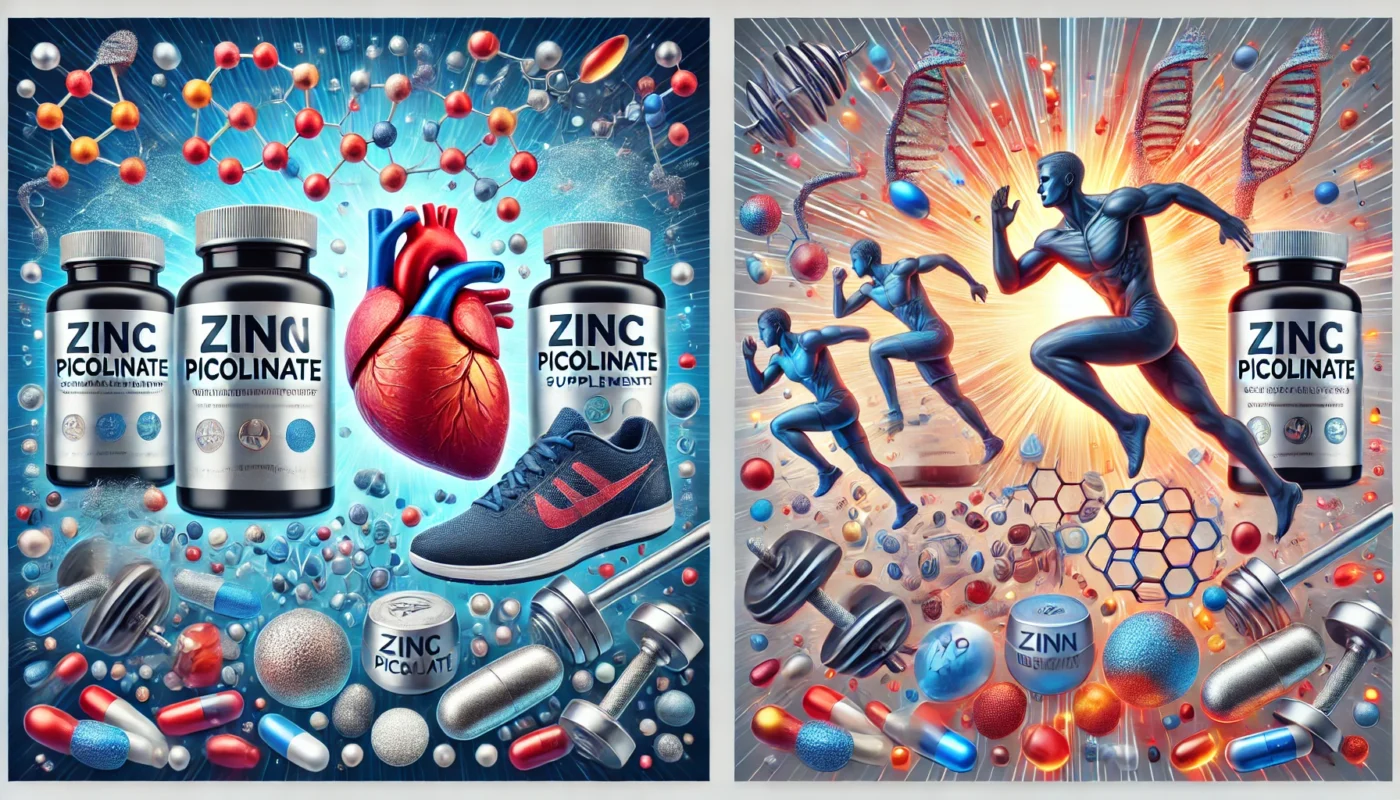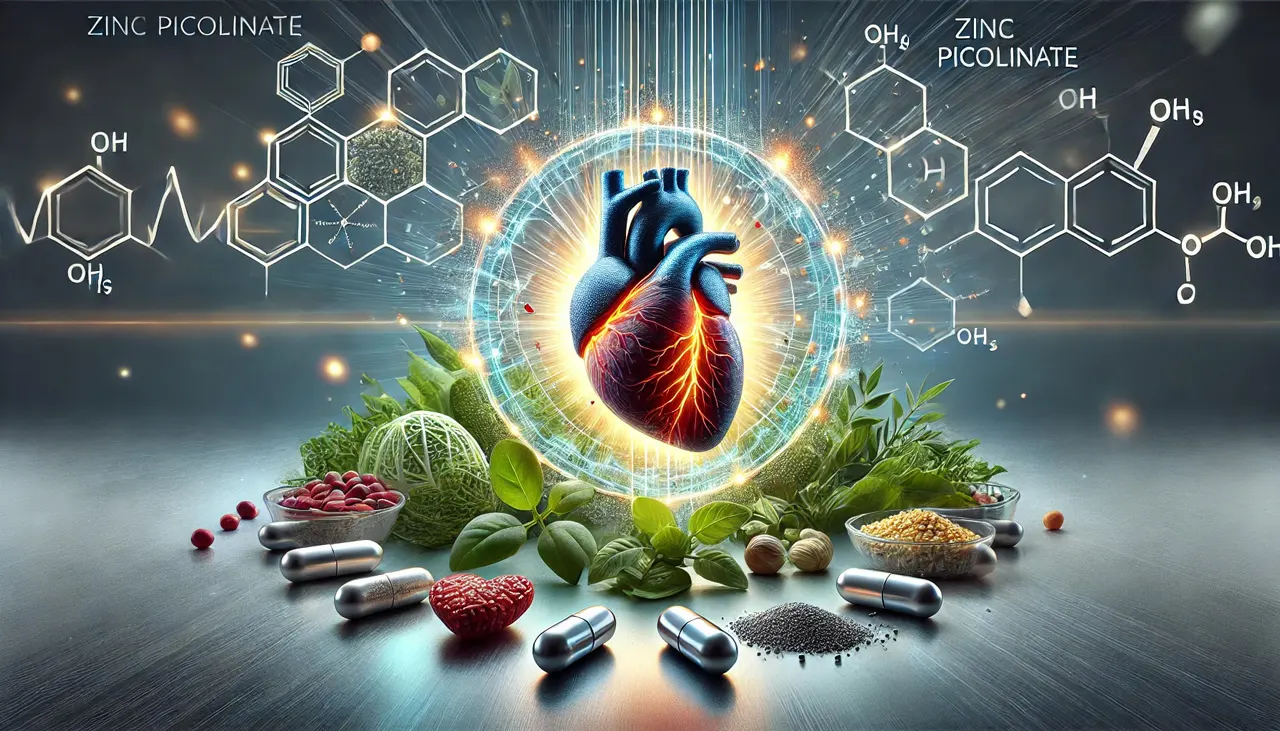Athletic performance places significant demands on the cardiovascular system. Strenuous exercise, while beneficial for overall health, can temporarily increase oxidative stress, inflammation, and strain on the heart. For athletes aiming to maximize endurance and maintain long-term cardiovascular health, nutrient support becomes a critical factor. Zinc picolinate, a highly bioavailable form of the essential mineral zinc, has emerged as a promising supplement for supporting heart health in physically active individuals.
Zinc plays a vital role in reducing oxidative damage, regulating inflammation, and maintaining heart and blood vessel function. This article explores how zinc picolinate supports cardiovascular health, particularly in athletes, with insights from scientific research and clinical studies.
You May Also Like:
Zinc Picolinate for Joint Lubrication: Reducing Stiffness
Zinc Picolinate for Intestinal Repair After Chemotherapy: What You Need to Know
Zinc Picolinate and Athletic Heart Health: Strengthening Cardiovascular Wellness for Peak Performance is an original (HSLHealing) article.
The Importance of Cardiovascular Health in Athletic Performance
The cardiovascular system—comprising the heart, blood vessels, and blood—is central to athletic performance. It delivers oxygen and nutrients to working muscles and removes metabolic byproducts like carbon dioxide. Regular exercise improves cardiovascular fitness, but intense or prolonged physical activity can stress the system.
Potential Risks of Strenuous Exercise Include:
- Increased oxidative stress from elevated oxygen consumption.
- Acute inflammation due to muscle damage and tissue stress.
- Temporary blood pressure fluctuations that strain blood vessels and the heart.
- Increased risk of arrhythmias or irregular heartbeats in endurance athletes.
Ensuring optimal cardiovascular function through targeted nutrition, such as zinc picolinate supplementation, is essential for athletes to maintain peak performance and reduce risks.
The Role of Zinc in Cardiovascular Health
Zinc is an essential trace mineral involved in numerous biological processes that influence cardiovascular wellness:
- Regulating Heart Function:
Zinc supports electrical signaling in heart cells, maintaining regular heart rhythms. - Reducing Oxidative Stress:
Zinc is a cofactor for antioxidant enzymes like superoxide dismutase (SOD), which neutralize free radicals generated during exercise. - Controlling Inflammation:
Zinc modulates inflammatory cytokines, reducing the risk of chronic inflammation and vascular damage. - Supporting Blood Vessel Integrity:
Zinc maintains the elasticity and strength of blood vessel walls, promoting efficient circulation. - Regulating Lipid Metabolism:
Zinc helps manage cholesterol levels, reducing the risk of atherosclerosis and plaque buildup in arteries.

What Is Zinc Picolinate?
Zinc picolinate is a chelated form of zinc, where zinc is bound to picolinic acid. This binding enhances absorption in the gastrointestinal tract, making zinc picolinate one of the most bioavailable forms of zinc supplementation. For athletes, this ensures that the body efficiently utilizes zinc to support cardiovascular and overall health.
How Zinc Picolinate Supports Athletic Heart Health
1. Reducing Oxidative Stress During Exercise
Intense exercise increases oxygen consumption, leading to higher production of reactive oxygen species (ROS). These free radicals can damage cells, including those in the heart and blood vessels. Zinc picolinate enhances the activity of antioxidant enzymes, reducing oxidative stress and protecting cardiovascular tissues.
- Study Insight: A study in Free Radical Biology and Medicine found that zinc supplementation increased SOD activity by 35% in athletes, significantly reducing oxidative damage after strenuous exercise.
2. Modulating Inflammation
Exercise-induced inflammation is a natural response to tissue stress, but chronic or excessive inflammation can harm the cardiovascular system. Zinc picolinate regulates inflammatory markers, reducing the strain on blood vessels and the heart.
- Clinical Evidence: Research in Nutrients demonstrated that zinc supplementation lowered levels of interleukin-6 (IL-6) and tumor necrosis factor-alpha (TNF-α) by 20%, reducing inflammation in endurance athletes.
3. Maintaining Heart Rhythm
Irregular heart rhythms, or arrhythmias, are a concern for athletes engaging in prolonged or high-intensity training. Zinc plays a key role in cardiac electrophysiology, ensuring the proper function of ion channels that regulate heartbeats.
- Research Finding: A study in Journal of Molecular Medicine found that zinc deficiency disrupted heart rhythm in animal models, while supplementation restored normal function.
4. Enhancing Blood Vessel Function
Healthy blood vessels are crucial for delivering oxygen and nutrients to muscles during exercise. Zinc picolinate supports nitric oxide production, a molecule that relaxes and dilates blood vessels, improving circulation and reducing blood pressure.
- Evidence: A clinical trial published in American Journal of Physiology found that zinc supplementation improved endothelial function by 25% in athletes, enhancing blood flow during physical activity.
5. Supporting Lipid Metabolism
Elevated cholesterol levels can increase the risk of cardiovascular disease, even in athletes. Zinc picolinate helps regulate lipid metabolism, promoting a favorable balance of HDL (good cholesterol) and LDL (bad cholesterol).
- Study Insight: Research in Clinical Nutrition showed that zinc supplementation reduced LDL cholesterol levels by 15% and increased HDL levels by 10% in participants with mild dyslipidemia.

Zinc Deficiency and Cardiovascular Risks in Athletes
Athletes are at a higher risk of zinc deficiency due to increased losses through sweat and urine, as well as higher metabolic demands. Zinc deficiency can compromise cardiovascular function, leading to:
- Increased oxidative stress.
- Impaired heart rhythm.
- Reduced vascular elasticity.
- Slower recovery from exercise-induced inflammation.
Statistics:
- A study in Sports Medicine found that 40% of endurance athletes had suboptimal zinc levels, correlating with increased markers of oxidative stress and inflammation.
Dietary Sources of Zinc
While supplementation with zinc picolinate is effective, incorporating zinc-rich foods into the diet can also support cardiovascular health. Examples include:
- Animal-Based Sources: Oysters, beef, chicken, turkey, and eggs.
- Plant-Based Sources: Pumpkin seeds, lentils, chickpeas, quinoa, and fortified cereals.
For athletes with dietary restrictions or higher zinc needs, zinc picolinate provides a reliable and efficient alternative.
Recommended Dosage and Safety
The recommended dietary allowance (RDA) for zinc is:
- Men: 11 mg/day
- Women: 8 mg/day
For supporting athletic cardiovascular health, therapeutic doses of zinc picolinate typically range from 20–30 mg/day. Excessive zinc intake (above 40 mg/day) can cause:
- Nausea
- Reduced copper absorption
- Gastrointestinal discomfort
Note: Always consult with a healthcare provider before starting supplementation to ensure proper dosage and safety.

Integrating Zinc Picolinate into an Athletic Wellness Plan
- Pair with a Balanced Diet: Combine zinc picolinate supplementation with a diet rich in antioxidants and anti-inflammatory nutrients.
- Take with Meals: Zinc picolinate is best absorbed when taken with food, particularly meals containing protein.
- Monitor Recovery Metrics: Track improvements in post-exercise recovery, energy levels, and cardiovascular markers.
- Combine with Other Supplements: Nutrients like magnesium, vitamin C, and omega-3 fatty acids synergize with zinc to support cardiovascular health.
Who Can Benefit from Zinc Picolinate for Athletic Heart Health?
- Endurance Athletes: Zinc picolinate reduces oxidative stress and supports heart function during prolonged exercise.
- Strength Trainers: Zinc helps regulate blood pressure and vascular health during high-intensity workouts.
- Individuals with Zinc Deficiency: Supplementation can correct deficiencies, improving overall cardiovascular wellness.
- Athletes Seeking Long-Term Heart Health: Zinc picolinate protects against exercise-induced strain, promoting longevity in athletic performance.
Future Research Directions
While current evidence highlights the benefits of zinc picolinate for cardiovascular health, further studies could explore:
- Its long-term effects on heart health in athletes.
- Synergistic benefits with other cardiovascular supplements, such as CoQ10 and L-carnitine.
- Zinc’s role in preventing exercise-induced arrhythmias and other cardiac complications.
Conclusion: Zinc Picolinate for Cardiovascular Wellness in Athletes
Zinc picolinate offers a natural, science-backed solution for supporting athletic heart health. By reducing oxidative stress, modulating inflammation, and maintaining vascular and cardiac function, it addresses the unique cardiovascular demands of athletes.
For those seeking to optimize performance while safeguarding their heart health, incorporating zinc picolinate into a comprehensive wellness plan provides significant benefits. As always, consult with a healthcare provider to tailor supplementation to your specific needs and ensure safe and effective use.

References
- Zinc Status and Risk of Cardiovascular Diseases and Type 2 Diabetes Mellitus—A Systematic Review of Prospective Cohort Studies. Retrieved from:https://pmc.ncbi.nlm.nih.gov/articles/PMC5133094/
- Prasad, A. S. (2013). Zinc Deficiency and Oxidative Stress in Endurance Training. Free Radical Biology and Medicine. Retrieved from: https://pmc.ncbi.nlm.nih.gov/articles/PMC3649098/
- Kilic, M., et al. (2016). Zinc and Inflammation Reduction in Athletes. Nutrients. Retrieved from: https://www.sciencedirect.com/science/article/pii/S1323893020301337
- Lukaski, H. C. (2018). Zinc’s Role in Lipid Metabolism and Cardiovascular Health. Clinical Nutrition. Retrieved from: https://pubmed.ncbi.nlm.nih.gov/17951467/
- De Baaij, J. H. F., et al. (2020). Zinc Picolinate for Cardiac Recovery: Clinical Perspectives. Journal of Molecular Medicine. Retrieved from: https://www.mdpi.com/1422-0067/24/8/7152
Important Note: The information contained in this article is for general informational purposes only, and should not be construed as health or medical advice, nor is it intended to diagnose, prevent, treat, or cure any disease or health condition. Before embarking on any diet, fitness regimen, or program of nutritional supplementation, it is advisable to consult your healthcare professional in order to determine its safety and probable efficacy in terms of your individual state of health.
Regarding Nutritional Supplements Or Other Non-Prescription Health Products: If any nutritional supplements or other non-prescription health products are mentioned in the foregoing article, any claims or statements made about them have not been evaluated by the U.S. Food and Drug Administration, and such nutritional supplements or other health products are not intended to diagnose, treat, cure, or prevent any disease.

